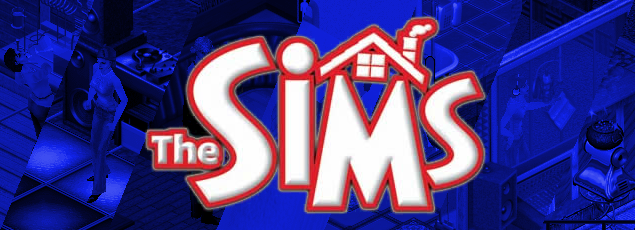
As a series, The Sims has been a proud ambassador of expansion packs as a content format to the extent that its the first series a lot of gamers think of when you ask them about expansions. Many even argue that when it came to building out the aesthetics and mechanics of the series, EA and Maxis went overboard, drowning us under a torrent of optional extras, and there may be a fair argument there, but the early Sims expansions, at least, were not cynical cash grabs. Each one of these packs was fully-formed enough to have its own personality and own ideas about how the systems of The Sims should be reconfigured. For anyone who played The Sims 1 with all the expansions, the thought of the game without them is the thought of a Sims with its wings clipped. But with them, the game spreads those wings wide. Here, we're going to look at the seven expansion packs for The Sims 1 and discuss how they playfully remixed Maxis's original slice-of-life sandbox.
Livin' It Up
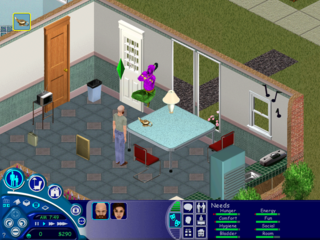
With Livin' It Up (or Livin' Large in America), it feels like Maxis are still searching for that formula that makes a Sims expansion because, unlike the later modules for the game, Livin' It Up lacks a theme which ties it all together. It's an eclectic mix of everything from telescopes to zombies to castles. The closest thing this expansion has to a unifying aesthetic is that it cribs many of its characters and items from genre fiction, providing us with additions like cursed paintings and robots. It's, in my eyes, a step down for the experience. There are plenty of fantasy and sci-fi games out there, but The Sims broke from the pride by being a down-to-earth video game, and this first expansion is anything but.
However, it must be said that many of the concepts that we would consider foundational to The Sims weren't part of its foundation and were instead integrated through expansions like this one. We might think of the Grim Reaper or having babies as quintessentially Sims, but you won't have those elements if you just buy that 2000 life sandbox; they only become parts of the whole with Livin' It Up. As improving and expanding your characters' lives in The Sims is done primarily through objects, the unique features of Livin' It Up manifest through new objects, ones that provide more complexity, and potentially, benefit than those in the base game. Their potential varies erratically though. The Genie's Lamp feels like a prank on the player, most of the time responding to their wishes by sabotaging them, while the Crystal Ball goes in the opposite direction, letting you add extra personality points for your sim, allowing you to boost their traits until they are a flawless Mary Sue. The biggest alteration you can make to your sims' lives comes with the vibrating bed which allows them to have sex and add babies to the family. It's a dose of realism in what is otherwise a highly wacky expansion. It's just a little unfortunate that adding a bouncing bundle of joy to the family involves dragging such an ugly piece of furniture into the home, and there's no good reason sims shouldn't be able to do the deed in any bed.
House Party
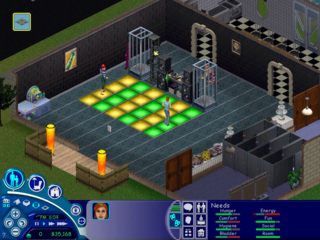
House Party is noteworthy as the first expansion for The Sims which has a coordinated theme, but it never lets that coordination dilute the variety, allowing you to purchase furniture with a raver, tiki, or western look. There are fresh sounds to be heard in this expansion as well; Maxis display an understanding of how music creates the mood for a party in adding five new radio stations to your town's airwaves. But House Party isn't just about adding new content; it is also the first Sims expansion which introduces a new event for sims to participate in: parties. The objects and music it adds are made more valuable to us as players because they help us raise the roof during these celebrations.
House Party, like the other sims expansions, creates new social playspaces that the base game was never built to support and yet what happens in those spaces feels plausible because the base game was so true-to-life in its mechanics. Here, we find something any designer of expansions must understand: For an expansion to do well, it can't just add new content; it needs to emphasise the best elements of the underlying game. By bringing out more options in the social dynamics and interior design that made The Sims fun, House Party succeeds at this. But it's hard to recommend throwing a party to most players. Parties do allow your sim to quickly fill up their phonebook which is useful when all the best-paying jobs ask that you have a small village's worth of friends, but they require a lot of planning and helicoptering over for little other gameplay reward. You can fill most sim's mood meters painlessly by having them hang out at their home with another family member and the only time I've found the parties necessary for giving your sim their social fix is when they're an outgoing blabbermouth with no one else in their house to talk to. House Party also does what many bad expansion packs do and puts a spotlight on the weaker areas of the base game it plugs into.
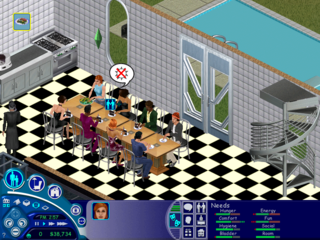
Something The Sims 1 always got around its neck was pathing. When a crowd of sims are all trying to get to the same spot, they enter a Three Stooges mode where everyone attempting to squeeze through a doorway at the same time means no one can. House Party is unflattering towards the pathing systems in that every party starts with a lot of sims trying to make it to the kitchen to grab a bite to eat and then goes on to have all those sims try to run to the bathroom at the same time as the meal pulls on their Bladder meters. Today, this problem could be solved by an AI director which could form a queue for any doorway in the house, but in The Sims 1, every person acts in their own self-interest. They're clear about where they want to be and willing to move one square out of the way for another sim, but never able to organise beyond that. The only way to reduce jams in the home is to build houses with multiple routes into the same rooms and micromanage sims' movement, but this still doesn't guarantee your characters smooth passage through the house and is a lot of grief just to make parties less troublesome.
Sometimes, even when guests have unfettered access to everything they need for a good time, they still won't use the objects that fill their need bars. I've seen sims in rooms packed with friends leave because their Social is too low or whine that they're bored while standing in a hall with a dance floor and a wide-screen TV. When this happens, the game lays the blame at your feet. Before we leave House Party behind, I do want to draw attention to how bizarre Drew Carey's cameo in this expansion is. While The Sims would later acquire a small zoo of celebrities, at this point in its history, the NPCs consisted of a maid, a robot, a repairman, etc. and yes, Drew Carey, the game's patron saint of parties.
Hot Date
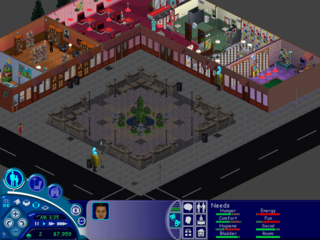
Putting aside its contents for a minute, you may remember Hot Date as the first Sims expansion which included box art in the iconic and immediately-recognisable style we now associate with The Sims 1. These covers went from eyesore to eye-candy overnight. As for what's behind that cover, Hot Date makes one of the most influential contributions to The Sims series, but it's not the dating; it's community lots. I get the impression that people often peg Unleashed for the expansion that made the original Sims, but I'd argue that by adding a new neighbourhood, Hot Date was as, if not more, transformative to the game. For the first time, we can step outside of households with our sims, as the game invites us to travel to "Downtown", a district of shops, bars, and restaurants. It may be that Downtown exists because Hot Date had to summon up a place that dates could take place in, or it could be that that once the designers had conceived of community lots, they needed a reason for players to transport their virtual dolls to these locations, hence the dates. Either way, the expansion brings with it a sense of sims existing in a town as opposed to a series of pocket dimensions. After Hot Date, every Sims 1 expansion goes on to introduce a new neighbourhood to the game.
Even if your sim never steps foot in a diner or boutique, the expansion reshapes social dynamics between sims in such a way that home life is never the same again. Hot Date takes the "Relationship" stat which measures the fondness sims have for each other and splits it into two new stats: "Daily Relationship" and "Lifetime Relationship". Every social poke and prod sims give each other drags these meters up or down, but they affect Daily Relationship more dramatically than Lifetime Relationship. Each day, the Lifetime bar is pulled a tiny bit further in line with the Daily bar. Through this system, the game acknowledges that how you feel about someone in the immediate is not necessarily how you feel about them in general and that it takes time to grow close to a person.

As you charm your way towards friendships and romances, Hot Date ensures you have a more vibrant palette of interactions available to you, and many of these new interactions are variations on existing ones which capture some of the nuances in human communication. For example, you could always have sims kiss one another, but Hot Date distinguishes between a peck, a hand kiss, and a romantic kiss. Sims can still hug, but Hot Date asks whether you want a friendly hug or an "embrace". In the design of these interactions, you can see Maxis mulling over how to depict adult relationships in a 12+ game and concluding that, even if they can't or won't show sexual content, they can show the strengthening of romantic bonds through how intimate the touch between any two people is. In fact, despite the salacious title, Hot Date is less explicit than Livin' It Up, an expansion which introduced sexual intercourse to the series. In their romance, however, both Livin' It Up and Hot Date are progressive for content packs released in 2000 and 2001 respectively. When video game controversy was still hot in the air and western cultures were more brazen with their homophobia, Maxis's expansions let you have characters of the same gender make all the romantic interactions with each other that characters of different genders could.
On Holiday
Hot Date implemented a new neighbourhood for your sims to kick back in and House Party was all about an event you could set off in their homes. On Holiday (or Vacation for Americans) combines the two ideas with a new neighbourhood dedicated to a new event. You can see how after conceiving of community lots, Maxis may then have become giddy at the thought of an expansion which afforded as much time in them as possible, and an extended period spent far away from home is the definition of a holiday. Unfortunately, like the parties in House Party, the holidays in On Holiday often stop short of providing you with any significant mechanical reward.
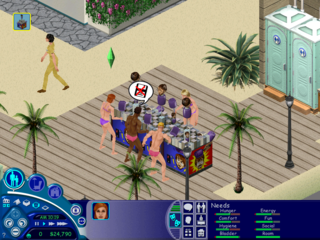
In real-life, vacations are desirable because we need time to decompress, we value unique experiences, and holiday destinations can bring us luxury we can't otherwise get. But in The Sims, you can take your character from overworked to overjoyed in a matter of hours and get them up to near-100% happiness in the comfort of their own home. All things considered, it may be harder to perk them up at a resort than in their house because, in lots several times the size of a regular house, the objects they need to improve their mood are, on average, further away from them. Plus, with many vacationers crammed into the same bars and hotels, pathing problems frequently arise. As a player, you may also react less than favourably to your sim being distanced from their work and social obligations. These aspects of life are potentially stressful in the real-world, but in well-designed video games, work is made fun, and so having it ripped away from us doesn't relax us as much as it makes us feel the experience just got shallower. Arguably, this expansion is limp in that it doesn't alter anything fundamental about the game. While Hot Date rolled out changes that transformed your sim's everyday life, the attractions of On Holiday are far removed from the loops you're playing with for at least 95% of the game. However, if your sim spends enough time dabbling in Vacation Island's carnival games, they can save up for a souvenir, a way in which this expansion can leave some tiny mark on their household.
Where On Holiday performs best is in letting us visit community lots with impeccably-realised styles. Like House Party, On Holiday introduces various sub-themes under its main theme: Beach, forest, and mountain. It then fills the relevant areas of Vacation Island with furniture, architecture, mascots, clothing, and activities to match. If that's enough for you then On Holiday is enough for you and if it's not then On Holiday is not. In hindsight, Maxis may have been teeing themselves up to fail by taking a base game designed around households and trying to retrofit on an expansion that removes players from the household.
Unleashed

The trifecta of influential Sims expansions is Livin' It Up, Hot Date, and Unleashed. If On Holiday feels like a sideshow to the base game because it fails to hook into the moment-to-moment play, Unleashed is transformative because it changes what The Sims entails on a constant basis, both inside and outside the home. Inside, the expansion adds pets, which are such a natural part of any household that you'll wonder how The Sims ever got by without them. Unlike sims, cats and dogs cannot be controlled directly, and so, as players, we have a different kind of relationship to them than we do our humans. Sims must be used as proxies in taking care of animals which coaxes out familiar interactions between people and pets. It would have been easy for the introduction of cats and dogs to make The Sims lose sight of the humans, but it stays on course, systemising them from the perspective of their owners rather than the pets themselves. At the same time, the autonomy of the pets makes them feel like their own spirits, and a combination of furry friends running through the house and ambient animals like racoons outside creates a lively energy for the residences.
While cats, dogs, and racoons can playfully scamper about the lots, Unleashed finds a means to incorporate less animated animals through the "object" mechanics. Maxis see that objects don't have to be literal objects. That is, mechanically, in The Sims, "object" means a persistent item that can be obtained through the "Buy Mode" and placed on a tile in a lot. However, there's nothing to stop that "object" being a perch for a parrot or a tank for an iguana, and so the game can use these tangible objects as a means for sims to interact with animals in their homes. A similar principle applies for the vegetable gardens you can cultivate.

Outside the house, Unleashed adds Old Town, which is really just a name for community lots that pop up in the same neighbourhood as your residential lots. While the previous two expansions imagined all the adventures your sims could have in locations external to their neighbourhood, Unleashed imagines the good times they can have within it, and creates more realistic towns by meshing shops and parks with housing. Sadly, this does outmode Downtown, the area from Hot Date. Unleashed may be the best of The Sims 1 expansions because it overhauls so many different areas of your sims' lives from changing the layout of the town to the dynamics of the household. It's upbeat, full of life, and has a whole new perspective on the player taking care of creatures under their command.
Superstar
Outside of Superstar, there are two other expansions to The Sims which throw in new jobs for your households and there four expansions which add new neighbourhoods, but this pack has the new neighbourhood be your new job. Any sim may now sign on the dotted line and join the "Superstar" career track in which they have no regular work hours but where you can taxi them to "Studio Town" once a day and have them interact with sets and recording booths to try and earn a little scratch. While every other Sims kept the process of work behind closed doors, Superstar throws them wide open.
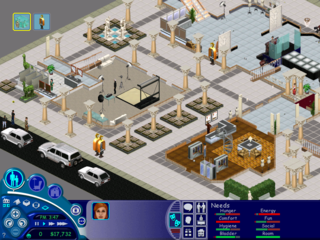
However, a good argument for the player not getting involved in a sim's career is that jobs often consist of a lot of repetitive and menial tasks. While the new neighbourhood of Studio Town is a pleasant novelty when you start playing Superstar, you soon tire of getting your sim in a good mood, stuffing them into a cab, marching them across a lot, and having them put on a performance every work day. Taking a break from the life of a celebrity is also not an option as your character's standing on the Fame career track decays over time. This is an accurate representation of how fleeting success in media can be, but a real superstar would be able to see more creative flexibility in their job than you get from clicking on a recording booth every other day. The expansion does include celebrity cameos both from classic Hollywood darlings and 21st-century artists but its very of-its-time. It's an expansion that considers Avril Lavigne as much of a Hollywood icon as Andy Warhol; Sarah McLachlan as a symbol of tinsel town the same way Marilyn Monroe is. None of our sims can be as distinguished as these performers either. To achieve stardom, sims must do a little modelling, a little acting, and a little singing, and this means they're undefined as artists.
Despite all that, there's a lot to like about Superstar. By sending your sim to a neighbourhood to work, you can bump up their mood meters while they earn their keep, and the expansion isn't afraid to deliver a few cultural sucker punches either. The Sims always had a sarcastic sense of humour, but Superstar feels positively sardonic in its take on Hollywood. While every other Sims expansion took you to a place of warmth and friendliness like log cabins and candle-lit dinner tables, Superstar transports you to a town of back-stabbing and artifice. The soundtrack is instrumental synthpop ripped right from the fashion runway and just take a moment to read some of the job descriptions in this pack:
"Who said it was lonely at the top? You've got more friends and fans than you know what to do with! Sure, you've burned some bridges on the way, but that's the mark of a true artist, nay... A GENIOUS![sic]".
"You thought it couldn't happen to you... You were going to make a masterpiece, stick to your friends, and change the system... from the "inside." Think again. Studio Town is nothing more than an unstoppable, unregulated, unthinking, UNFEELING money-making machine. You can't fight it... you can only RIDE it".
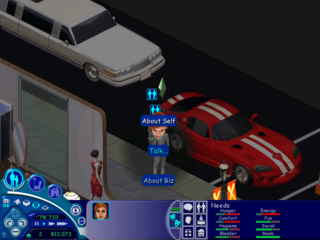
Like Hot Date, this expansion looks at how locations colour the interactions of the people in them. You'll find that many of the trendsetters of Studio Town won't talk to you until your Fame is high enough, and even then, interactions cannot start with small-talk about interests or by physical contact; sims newly acquainted through Studio Town will only brag, grovel, or prattle on about the industry. It's harder to make friends with the "somebodies" than with the residents of your hometown, but you need the celebrities to boost your "Friends Total Starpower" and earn more Fame. Your options are to abandon anyone not sufficiently popular enough so you have more time to get in with the in-crowd or to inch your way closer to the celebrities while maintaining a circle of lower profile friends that your character can still enjoy hugs and jokes with. You'll also find you're likely to crash and burn unless your sim either starts the Superstar career with money saved up or has a partner that can financially support them. While you can make profuse amounts of money when you're the talk of the town, being a bit player and a magazine model pays less than many low-level jobs in other career tracks. Your sim may need talent to get famous, but Superstar says that, to Hollywood, talent means nothing without friends in the right places and cold, hard cash.
Makin' Magic
Makin' Magic probably wouldn't exist if the planet weren't gripped with Potter fever during its development. EA released the expansion in 2003, by which time we'd been graced with the first five Harry Potter books and the first two film adaptations of those books. But if Makin' Magic was riding Rowling's wave, it was still doing it without being derivative. Harry Potter is inspired by British boarding schools, English folklore, and classic fantasy literature like The Chronicles of Narnia. Makin' Magic feels like it was stolen from old fairgrounds, horror movie sets, and Eastern-European rusticism. What both Potter and Makin' Magic are fascinated by, however, is domestic magic: Spells and charms not necessarily to cast fireballs or inflict fear but to wash the dishes or make a roommate fall in love with you.

The spells and charms of this expansion are more or less cheats, but ones that the game has you work towards and that are accepted as part of the fictional universe of The Sims. But maybe you don't want your down-to-earth life sim polluted by all this fantasy, or maybe you're not interested in breaking the game. Unfortunately, no household is safe from a visit from Makin' Magic's Magico. On every doorstep, you can find a box containing starter supplies for a budding sorcerer; the magic is thrust upon you whether you want it or not. You can delete the box, but then you never get another, so you're often going to want to keep the option to turn your sims into witches or wizards open, but that makes the mysterious box a semi-permanent part of the environment. This is annoying when the package drags down the score of any room it's in.
If you do want to take your sim from muggle to magician, don't expect the spell or charm systems to be transparent in any way. In-world books will show you which ingredients combine to make new spells and charms but won't tell you what those spells and charms are until you've made them once. You must pay careful attention to the tome to work out what ingredients you need, but you're never told the source of these ingredients. Many can be bought using Magicoins, a currency unique to Makin' Magic. Magicoins can be obtained by selling magic items or through tests of your sims skills, although you're not told these tests are skill-based at the time, and many of these tests must still be ground out to get the coins you need. You must win other ingredients from quests which consist of simple minigames such as races and puzzles. These minigames would be a breeze to control in any other system but are a chore to manipulate using the movement and conversation wheel interfaces of The Sims. The most infuriating of the quests is a Pokémon-style type-matching battle where the game doesn't tell you which type beats which.

Once you have your ingredients, you can only view them through the tiny inventory window in the bottom-right of the screen, and you also need to be confident that you've met the success conditions of your chosen spell or charm, or it will consume your ingredients and backfire on you. You're given only vague hints or sometimes no hints as to what the success conditions are. Playing with a strategy guide feels compulsory, but back in 2003, not everyone was online and able to load one up from GameFAQs.
If I were forced some positive things about Makin' Magic's design, I'd tell you that, considering it came out in the early 00s, it was very forward-thinking to have a crafting system in here, and in Makin' Magic, Maxis also manage to mingle content between this expansion and others. There is a spell which will turn a pet into a sim if you have Unleashed installed and a charm that can increase a person's fame if you have Superstar on your hard-drive. Sims can also adopt a dragon as a pet which does not require the Unleashed expansion but is still an example of Maxis developing a concept and code from a bygone content pack. I wish Makin' Magic more consistently strove to build on what The Sims was before. It's a fantasy RPG expansion to a down-to-earth life sim, and the clash between those two concepts is gruesome.
Conclusion
Not every one of these expansion packs was a winner, but overall I'm not sure I've ever seen a better run of optional content for a video game. With a few exceptions, most companies today are developing expansion packs which add new levels and narratives to their games, but The Sims already offered players the chance to create as many new characters, places, and stories as they could muster. So to evolve the experience of The Sims, Maxis looked not to have the player running the same loops in new levels but thought about how they could augment those loops. It was an iterative kind of design that brought us not just more places to play in but more ways to play, which is what creates depth in an expansion pack. As The Sims is a game largely about architecture and interior design, it is also the case that even the cosmetic content that these expansion packs add can be put to more meaningful use than the cosmetics of most other games. If The Sims does have levels, then they're levels you build yourself, and every one of these expansions means more creative authority.
This title was a vanguard for a new way of thinking about content distribution. Games were traditionally sold and installed in one whole lump, the composition of which was decided by the developer, but The Sims thought that the player themselves should choose what themes and mechanics were included in the game. It's a mindset that helped lead to the 00s explosion of DLC which revolutionised how games were made and played. Thanks for reading.
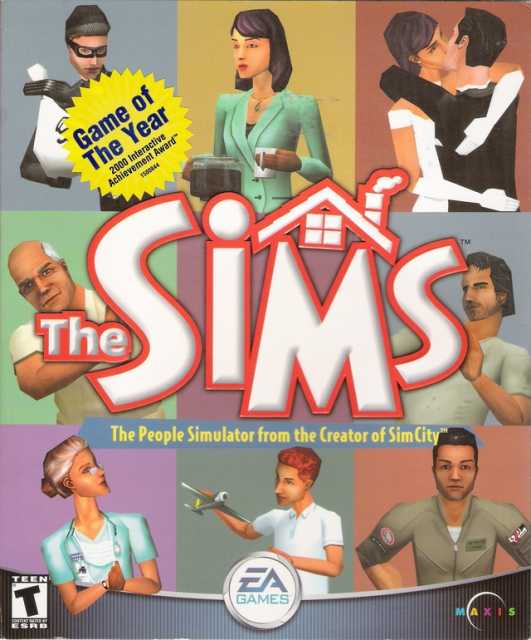
Log in to comment